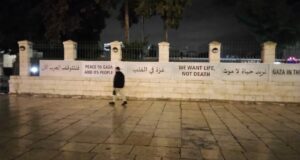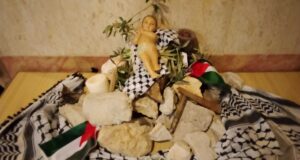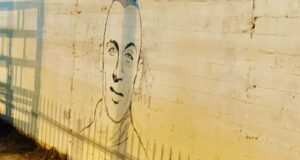By Raffi Berg
For the Palestinian children of Hope Flowers School, violence and conflict is a part of everyday life.
Just six km (four miles) from Jerusalem, their village has seen repeated Israeli incursions, shootings and demolitions by the army.
It is fertile breeding ground for militancy, but, at the hilltop school – a unique project in the West Bank and Gaza – concepts of hatred and retribution are shunned.
“Unfortunately we’re in a time when hate has escalated between the two sides,” says Ghada Ghabboun, the school’s co-director.
“For many Palestinians, Israelis are the enemy, and vice-versa, but here we work hard against this kind of stereotyping.”
Founded as a kindergarten in 1984, the institution places peace and democracy at the heart of its syllabus and extra-curricula activities, promoting non-violence and dialogue as means for conflict resolution.
As such, its methods and programmes have been groundbreaking.
Hope Flowers was the first school in the Palestinian territories to hold inter-faith lessons, instead of splitting its Christian and Muslim pupils into separate classes, and has invited rabbis from Israel to teach the pupils about Judaism.
It was also the first Palestinian school to teach Hebrew, to try to engender trust among the children towards Israelis.
The move did not go down well with local Palestinian militants, who accused the school’s founder, Hussein Issa, of being a collaborator and torched the school bus.
“There were so many challenges,” says Ms Ghabboun. “In the 1980s, it was a new idea. Back then, Palestinians rejected the idea of speaking to Israelis and the notion of co-existence.
“But after 23 years, the school has succeeded and managed to overcome the opposition of Palestinians.”
Firebombed
The vision of the school was born out of the grinding poverty and harsh conditions of the Deheishe refugee camp, just south of Bethlehem, to which Hussein Issa’s family fled during the 1948-49 Arab-Israeli war.
While many of his contemporaries harboured thoughts of revenge, he sought a different way to effect positive change for the Palestinians, by bringing Arabs and Israelis together.
To this end he established the al-Amal – or Hope – kindergarten, for Israeli and Palestinian children – the first such centre of its kind, embracing children from both sides of the conflict.
Some Palestinians, however, opposed the concept violently. Hussein Issa was a target of attack, his car was set on fire and the family home was firebombed.
It is precisely this fear of the unknown which the school aims to dispel.
“When you speak about ‘the enemy’ you don’t know him, you create an image of a monster, you deprive him of his humanity,” says Hussein Issa’s son, Ibrahim, also a co-director of the school.
“I have many Israeli friends and some I differ with, but we have one common ground, we are all human beings, and it’s important to see even your enemy in this way.”
Through the 1980s and 90s, as contacts between Israelis and Palestinians – politically and socially – began to grow, so the kindergarten began to take root.
It evolved into Hope Flowers school in 1989, and by the year 2000, some 600 students from Bethlehem, Hebron, Jerusalem and surrounding villages were on its register.
The school was recognised by the Palestinian Authority and there were even exchange programmes with Israeli schools in Netanya, Hadera and Tel Aviv.
Demolition threat
Hussein Issa lived to see his dream become a reality but died in March 2000.
Before the end of the year, the outbreak of the second Palestinian intifada dealt the school a devastating blow.
The exchange programmes with Israeli schools ground to a halt when the Israeli government barred its citizens from travelling to Palestinian areas because of security risks.
As unemployment in the West Bank soared as a result of the closure of the territory, pupils’ parents lost their jobs and could no longer afford the US $550-a-year (UK £270) tuition fees.
With an increasing financial burden, the school was eventually forced to lay off 16 of its 30-strong staff.
Israeli road closures and other obstacles also meant many children could no longer reach the school, and the number of pupils fell by more than half.
But a more immediate threat to the future of Hope Flowers lies just beyond its peeling blue painted gates.
There the Israeli army is building part of its 700km-long West Bank barrier, which staff say will cut the school off from other parts of the West Bank.
Israel says the barrier is meant as protection against suicide bombers, while Palestinians see it as a device to grab land and the International Court of Justice has declared it illegal.
“It’s frightening. When the wall is finished, there will be surveillance cameras, trenches and watch-towers,” says Ms Ghabboun.
“For the Israelis, these are security measures, but for us they mean danger.”
In the shadow of the wall lies the school’s unfinished cafeteria, under demolition order by the Israeli army since 1998. The order is frozen pending appeals.
The structure now also falls inside a 200m no-man’s-land on either side of the wall, within which construction is prohibited.
Officials say the order was issued because the cafeteria was built without a permit, but staff believe it is to make way for the expansion of the adjacent Jewish settlement of Efrat.
Nor does the school itself have a building permit from the Israeli authorities, which means it too could one day be pulled down.
Mr Issa says a permit would cost $60,000, which the school could not possibly afford.
But despite such obstacles, Ms Ghabboun is sanguine about the future.
“There have been worse times than this in our history,” she says. “Normal life is difficult for the Palestinians, but the name of the school is Hope, so we’ll never say we can’t go on.”
 International Solidarity Movement Nonviolence. Justice. Freedom.
International Solidarity Movement Nonviolence. Justice. Freedom.


